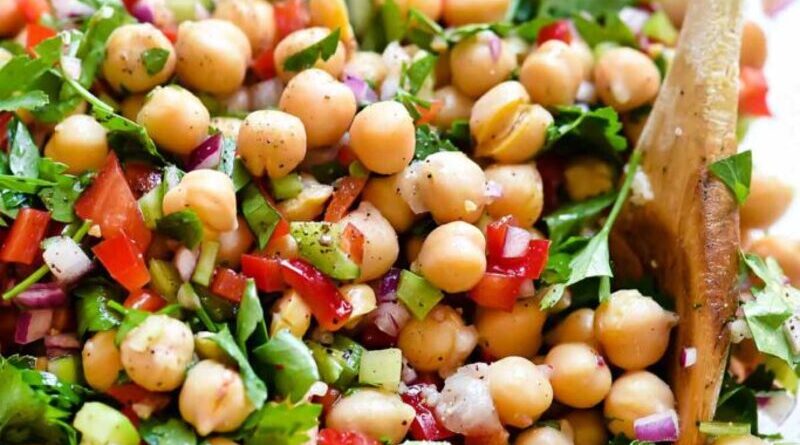Are Chickpeas Healthy? Discover Amazing Health Benefits
Garbanzo beans, or chickpeas, are a type of bean that is highly appreciated for its culinary versatility and superior nutritional value. Their many health advantages and ability to complement different diets have contributed to their current rise in popularity. We examine the question: Are chickpeas healthy? in this article. Come learn about the health benefits, nutritional value, and doable ways to include chickpeas in your diet for a better way of living as supported by scientific research.
Nutritional Profile of Healthy Chickpeas
| Nutrition | Facts |
|---|---|
| Calories | 269 |
| Protein | 14.5 grams |
| Fat | 4 grams |
| Carbs | 45 grams |
| Fiber | 12.5 grams |
| Manganese | 74% of the Daily Value (DV) |
| Folate (vitamin B9) | 71% of the DV |
| Copper | 64% of the DV |
| Iron | 26% of the DV |
| Zinc | 23% of the DV |
| Phosphorus | 22% of the DV |
| Magnesium | 19% of the DV |
| Thiamine: | 16% of the DV |
| Vitamin B6 | 13% of the DV |
| Selenium | 11% of the DV |
| Potassium | 10% of the DV |
Health Benefits of Consuming Healthy Chickpeas
Chickpeas provide numerous health advantages:
- Chickpeas, being high in protein and fiber, help control weight by increasing fullness and lowering caloric consumption.
- They are advantageous for people with diabetes or those trying to avoid blood sugar rises since they help to stabilize blood sugar levels.
- Because they control blood pressure and reduce LDL cholesterol, chickpeas are good for the heart.
- Their high fiber content helps to maintain a healthy gut microbiota and supports digestive health by avoiding constipation.
- Antioxidants included in chickpeas can lessen inflammation and the chance of developing chronic illnesses like cancer.
- They also supply vital minerals that promote general health, such as iron, folate, and magnesium.
Role of Chickpeas in Weight Management
Because they are high in fiber and protein, chickpeas are important for managing weight. By enhancing sensations of fullness and satisfaction, these nutrients help people consume less calories overall.
Furthermore, the low glycemic index of chickpeas helps to maintain blood sugar levels and avoid hunger spikes. People can enjoy tasty and fulfilling recipes while supporting their weight loss or maintenance objectives by adding chickpeas to their meals.
Impact of Healthy Chickpeas on Heart Health
Chickpeas have a high fiber content that helps lower LDL (bad) cholesterol, which is a good thing for heart health. Chickpeas also contain minerals like potassium and magnesium, which improve cardiovascular health by regulating blood pressure.
Their anti-inflammatory qualities also help to reduce inflammation, which lowers the risk of heart disease. All things considered, eating chickpeas can help you have a healthier heart and reduce your chance of developing cardiovascular issues.
Incorporating Chickpeas into Various Diets
Chickpeas are very adaptable and suitable for a range of diets, meeting varying dietary requirements and tastes:
Vegan and Vegetarian Diets:
As a plant-based protein substitute for meat, chickpeas can be used in recipes such as healthy hummus, salads, and curries.
Mediterranean Diet:
Featured in salads, hummus, and falafel, chickpeas are a mainstay of Mediterranean cuisine, enhancing a diet high in fruits, healthy vegetables, complete grains, and olive oil.
Gluten-Free Diets:
Since chickpeas are naturally gluten-free, anyone with celiac disease or gluten sensitivity can eat them. They can serve as a foundation for dishes devoid of grains or be used in gluten-free baking.
Low-Carb and Keto Diets:
Chickpeas are higher in carbohydrates, but they can be used in low-carb and ketogenic diets in moderation to add minerals, fiber, and protein in portion-controlled amounts to meals.
Delicious and Healthy Chickpea Recipes
Chickpeas are an excellent addition to many delectable recipes due to their high versatility and nutritional value. Here are a few quick and simple suggestions to get you started in the kitchen:
Hummus:
For a creamy dip or spread, blend chickpeas with tahini, olive oil, lemon juice, and garlic.
Healthy Chickpeas Salad:
For a light salad, combine chopped veggies, herbs, and chickpeas with a basic vinaigrette.
Healthy Chickpeas Curry:
For a tasty and filling curry, cook chickpeas with tomatoes, coconut milk, and spices.
Roasted Chickpea Snack:
For a crunchy snack, toss chickpeas with spices and olive oil, then roast until crispy.
Chickpea Stir-Fry:
Stir-fry vegetables and chickpeas with soy sauce to make a healthy and rushed dinner.
Chickpea Buddha Bowl:
Incorporate chickpeas into a nutritious and well-balanced bowl together with grains, vegetables, and avocado.
Healthy Chickpeas Cookies:
For a nutritious and decadent treat, blend chickpeas with chocolate chips and almond butter.
Conclusion
Finally, it should be noted that chickpeas are unquestionably a nutritious powerhouse, providing a wide range of health advantages and culinary diversity. Their abundant nutrient profile, which includes fiber, vitamins, minerals, protein, and fiber, promotes heart health, weight control, and general well-being. Chickpeas may easily be included in any diet, including vegan, gluten-free, and low-carb ones. This makes them a great complement to any meal plan.
Chickpeas present a plethora of delectable cooking options that are sure to please any appetite and provide a sense of well-being for the body and the soul. A more vibrant culinary experience as well as a healthier lifestyle can result from incorporating chickpeas as a mainstay in your diet.
You Can Read More About Chickpea
Discover the Ultimate Quinoa Chickpea Salad: A Vibrant Fusion
